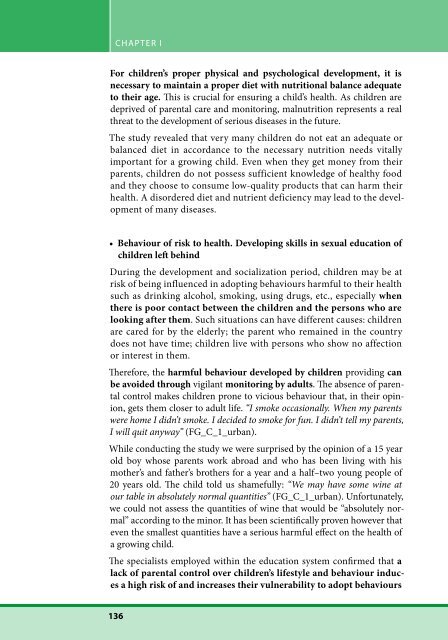specific needs of children and elderly left behind as a ... - IOM Moldova
specific needs of children and elderly left behind as a ... - IOM Moldova
specific needs of children and elderly left behind as a ... - IOM Moldova
You also want an ePaper? Increase the reach of your titles
YUMPU automatically turns print PDFs into web optimized ePapers that Google loves.
CHAPTER I<br />
For <strong>children</strong>’s proper physical <strong>and</strong> psychological development, it is<br />
necessary to maintain a proper diet with nutritional balance adequate<br />
to their age. This is crucial for ensuring a child’s health. As <strong>children</strong> are<br />
deprived <strong>of</strong> parental care <strong>and</strong> monitoring, malnutrition represents a real<br />
threat to the development <strong>of</strong> serious dise<strong>as</strong>es in the future.<br />
The study revealed that very many <strong>children</strong> do not eat an adequate or<br />
balanced diet in accordance to the necessary nutrition <strong>needs</strong> vitally<br />
important for a growing child. Even when they get money from their<br />
parents, <strong>children</strong> do not possess sufficient knowledge <strong>of</strong> healthy food<br />
<strong>and</strong> they choose to consume low-quality products that can harm their<br />
health. A disordered diet <strong>and</strong> nutrient deficiency may lead to the development<br />
<strong>of</strong> many dise<strong>as</strong>es.<br />
• Behaviour <strong>of</strong> risk to health. Developing skills in sexual education <strong>of</strong><br />
<strong>children</strong> <strong>left</strong> <strong>behind</strong><br />
During the development <strong>and</strong> socialization period, <strong>children</strong> may be at<br />
risk <strong>of</strong> being influenced in adopting behaviours harmful to their health<br />
such <strong>as</strong> drinking alcohol, smoking, using drugs, etc., especially when<br />
there is poor contact between the <strong>children</strong> <strong>and</strong> the persons who are<br />
looking after them. Such situations can have different causes: <strong>children</strong><br />
are cared for by the <strong>elderly</strong>; the parent who remained in the country<br />
does not have time; <strong>children</strong> live with persons who show no affection<br />
or interest in them.<br />
Therefore, the harmful behaviour developed by <strong>children</strong> providing can<br />
be avoided through vigilant monitoring by adults. The absence <strong>of</strong> parental<br />
control makes <strong>children</strong> prone to vicious behaviour that, in their opinion,<br />
gets them closer to adult life. “I smoke occ<strong>as</strong>ionally. When my parents<br />
were home I didn’t smoke. I decided to smoke for fun. I didn’t tell my parents,<br />
I will quit anyway” (FG_C_1_urban).<br />
While conducting the study we were surprised by the opinion <strong>of</strong> a 15 year<br />
old boy whose parents work abroad <strong>and</strong> who h<strong>as</strong> been living with his<br />
mother’s <strong>and</strong> father’s brothers for a year <strong>and</strong> a half–two young people <strong>of</strong><br />
20 years old. The child told us shamefully: “We may have some wine at<br />
our table in absolutely normal quantities” (FG_C_1_urban). Unfortunately,<br />
we could not <strong>as</strong>sess the quantities <strong>of</strong> wine that would be “absolutely normal”<br />
according to the minor. It h<strong>as</strong> been scientifically proven however that<br />
even the smallest quantities have a serious harmful effect on the health <strong>of</strong><br />
a growing child.<br />
The specialists employed within the education system confirmed that a<br />
lack <strong>of</strong> parental control over <strong>children</strong>’s lifestyle <strong>and</strong> behaviour induces<br />
a high risk <strong>of</strong> <strong>and</strong> incre<strong>as</strong>es their vulnerability to adopt behaviours<br />
136

















